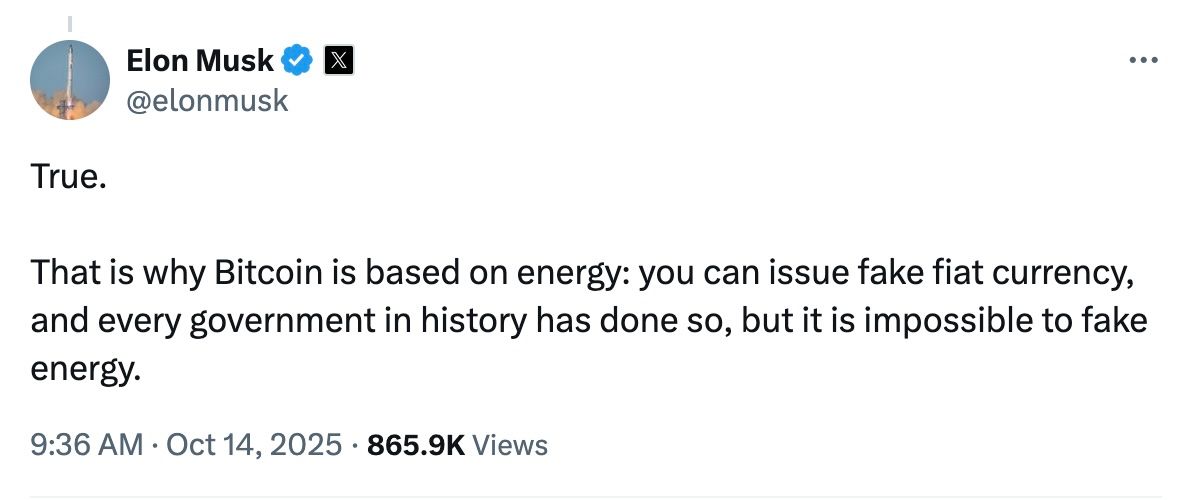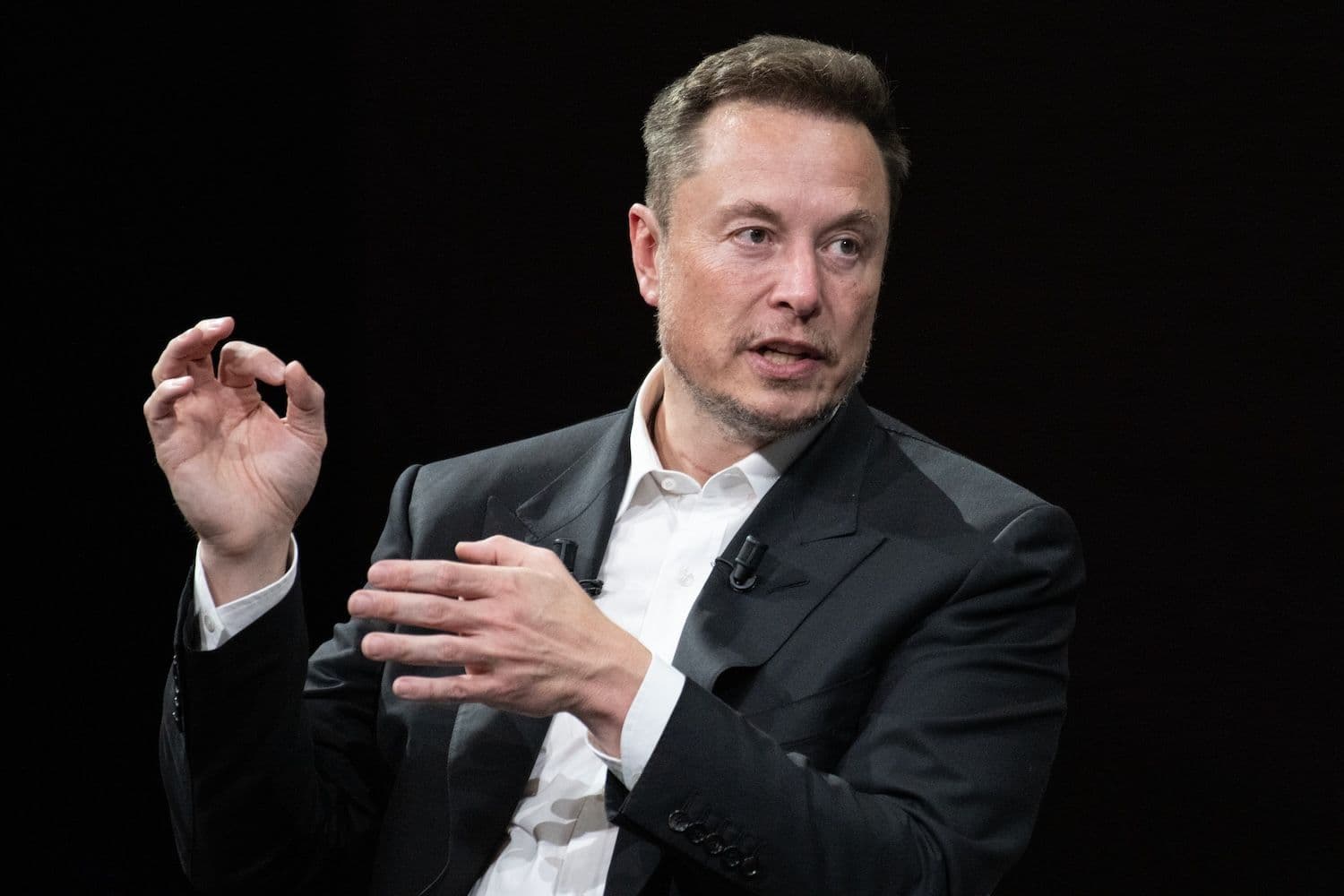Elon Musk declared Bitcoin superior to government-issued currencies in a post on X, arguing the cryptocurrency's foundation in energy expenditure makes it impossible to counterfeit unlike fiat money that every government has historically debased. The Tesla CEO's statement came as Bitcoin traded at $111,136, while investor confidence remains shaken following recent market volatility.
What to Know:
- Musk responded to a post linking the AI arms race to surging hard assets, stating Bitcoin's energy-based design prevents the artificial currency expansion that plagues fiat systems.
- Tesla maintains approximately $1.28 billion in Bitcoin holdings, down from a record $1.4 billion in October 2025, making it one of the largest corporate Bitcoin treasuries.
- The market showed little reaction to Musk's endorsement despite his historical influence on cryptocurrency prices, particularly in the meme coin sector where his posts have triggered rapid price swings.
Musk Frames Bitcoin as Proof-of-Energy System
Musk made his comments in response to market analyst Zerohedge, who connected the global competition in artificial intelligence development to rising demand for tangible assets including gold, silver and Bitcoin.
"AI is the new global arms race… and capex will eventually be funded by governments… But you can't print energy," Zerohedge wrote.
"Bitcoin is based on energy: you can issue fake fiat currency, and every government in history has done so, but it is impossible to fake energy," Musk replied. The statement quickly gained traction online, positioning Bitcoin as what Musk called a system where energy expenditure establishes trust rather than government decree.
The exchange reflects broader economic discussions about scarcity and value as AI infrastructure demands unprecedented electrical power. Data centers and computing facilities now consume massive energy resources, prompting analysts to reconsider how real-world resource constraints define worth in digital economies.
Musk presented Bitcoin as inherently resistant to arbitrary expansion because mining requires actual computational work and electricity consumption.
His comment marks a departure from his typically cautious public stance on Bitcoin. While Musk has discussed cryptocurrency in the past, this direct comparison to fiat currency signals stronger conviction about Bitcoin's fundamental design advantages, particularly as governments increase spending to fund technological competition with rivals.
The cryptocurrency market barely reacted to Musk's statement. Bitcoin remained under pressure following recent market turbulence that has extended what analysts describe as the longest period of investor hesitation on record. Yet Musk retains significant influence in cryptocurrency markets, especially among speculative tokens where his social media posts have historically caused dramatic price movements within minutes.

Tesla's Bitcoin Position and Musk's Crypto History
Tesla ranks among the largest public company holders of Bitcoin. Data from Arkham Intelligence shows the electric vehicle manufacturer's Bitcoin treasury peaked at roughly $1.4 billion in October 2025, the highest valuation since May 2022. Current estimates place Tesla's holdings near $1.28 billion following the recent price decline.
Musk has drawn parallels between Bitcoin's architecture and other technologies before.
In June, he announced that X's forthcoming XChat messaging platform would feature encryption modeled on Bitcoin's design, describing it as "Bitcoin-style encryption" built with the Rust programming language. The comparison suggested Musk views Bitcoin's cryptographic framework as a technical standard worth replicating.
He stated in March 2022 that he personally owns Bitcoin, Ethereum and Dogecoin and has no plans to sell those holdings.
Musk argued at the time that scarce, tangible assets outperform currency during inflationary periods, echoing arguments made by prominent Bitcoin advocate Michael Saylor.
Saylor, whose company MicroStrategy holds billions in Bitcoin, has repeatedly described the cryptocurrency as "digital energy." In March 2022, Saylor wrote that owning scarce assets beats holding currency derivatives during inflation, though he acknowledged the difficulty of determining which assets maintain scarcity and desirability over time.
Understanding Proof-of-Work and Energy in Bitcoin
Bitcoin operates on a proof-of-work system where miners compete to solve complex mathematical problems using specialized computers. This process requires substantial electricity, creating what supporters call an unforgeable link between the digital asset and real-world energy consumption. Critics have long challenged this model's environmental impact, while proponents argue it establishes verifiable scarcity that fiat currency lacks.
Fiat currency refers to government-issued money not backed by physical commodities like gold. Central banks can increase fiat supply through monetary policy decisions, a practice that has accelerated in many countries following economic crises. Bitcoin's supply is capped at 21 million coins through its underlying code, a limit that cannot be altered without consensus from the network's participants.
Closing Thoughts
Musk's statement reinforces his position that Bitcoin represents a fundamentally different monetary system than government currencies. His comments align with arguments that energy-intensive cryptocurrency mining creates verifiable scarcity in digital form. Whether this perspective gains broader traction among investors and policymakers remains uncertain as Bitcoin faces ongoing price pressure and regulatory scrutiny.



